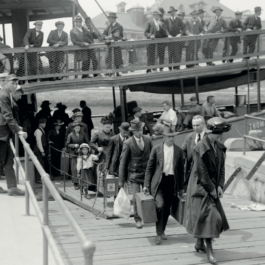
September 10: James Mark at Socialist Medicine Seminar

Please join us for our monthly Socialist Medicine Seminar.
James Mark (University of Exeter) will present:
WILSON'S WHITE WORLD: THE FOUNDATION OF CENTRAL-EASTERN EUROPEAN NATION-STATES AFTER WORLD WAR I
September 10, 14:00-16:00 CET
Room 5028, Friedrichstraße 191-193
Sign up for the Zoom link by clicking here and filling out this form.
James Mark will introduce the volume Off white: Central and Eastern Europe and the global history of race and his own contribution, which examines how Central and Eastern Europe’s self-determination and nation-building was conceptualized, enacted (and contested) as part of a broader world of colonial and racial thought. The volume, which Mark co-edited, examines why Central and Eastern Europe has long been removed from global histories of race, and explores the region’s modern development as a white European periphery integrating into the racially hierarchical international order over the last two hundred years.
At the time Mark observes, contemporary Black American intellectuals and some anti-colonial leaders discussed the emancipation of the ‘weak and white’ Poland, Czechoslovakia, and the Baltic states, and the simultaneous denial of statehood to the ‘darker nations’, as the defense of a white world now felt to be under threat from a rising East and anti-colonial movements in the South. Nationalists in the region itself often performed this commitment to a white colonial Europe: as protectors of the continent’s eastern borders from ‘Asiatic barbarism’; as potential colonists in Africa; or as bringers of white bourgeois European culture to their own ‘darker’ poorer minorities within. Rising leftist movements criticized this conception of Europe. This paper concludes with a history of how the memory of these ‘raced pasts’ was sidelined, particularly after the Second World War. This silencing under both Communism and liberal democracy underpinned an idea of racial innocence which has been recently exploited by populist movements.
JAMES MARK is a professor of history at the University of Exeter and Principal Investigator on the 1989 after 1989 project. His main areas of research are Eastern European cultures of memory, the social and cultural history of Communism, and the relationship between Eastern Europe and global histories of imperialism, anti-imperialism, and race.

September 10: James Mark at Socialist Medicine Seminar

Please join us for our monthly Socialist Medicine Seminar.
James Mark (University of Exeter) will present:
WILSON'S WHITE WORLD: THE FOUNDATION OF CENTRAL-EASTERN EUROPEAN NATION-STATES AFTER WORLD WAR I
September 10, 14:00-16:00 CET
Room 5028, Friedrichstraße 191-193
Sign up for the Zoom link by clicking here and filling out this form.
James Mark will introduce the volume Off white: Central and Eastern Europe and the global history of race and his own contribution, which examines how Central and Eastern Europe’s self-determination and nation-building was conceptualized, enacted (and contested) as part of a broader world of colonial and racial thought. The volume, which Mark co-edited, examines why Central and Eastern Europe has long been removed from global histories of race, and explores the region’s modern development as a white European periphery integrating into the racially hierarchical international order over the last two hundred years.
At the time Mark observes, contemporary Black American intellectuals and some anti-colonial leaders discussed the emancipation of the ‘weak and white’ Poland, Czechoslovakia, and the Baltic states, and the simultaneous denial of statehood to the ‘darker nations’, as the defense of a white world now felt to be under threat from a rising East and anti-colonial movements in the South. Nationalists in the region itself often performed this commitment to a white colonial Europe: as protectors of the continent’s eastern borders from ‘Asiatic barbarism’; as potential colonists in Africa; or as bringers of white bourgeois European culture to their own ‘darker’ poorer minorities within. Rising leftist movements criticized this conception of Europe. This paper concludes with a history of how the memory of these ‘raced pasts’ was sidelined, particularly after the Second World War. This silencing under both Communism and liberal democracy underpinned an idea of racial innocence which has been recently exploited by populist movements.
JAMES MARK is a professor of history at the University of Exeter and Principal Investigator on the 1989 after 1989 project. His main areas of research are Eastern European cultures of memory, the social and cultural history of Communism, and the relationship between Eastern Europe and global histories of imperialism, anti-imperialism, and race.
